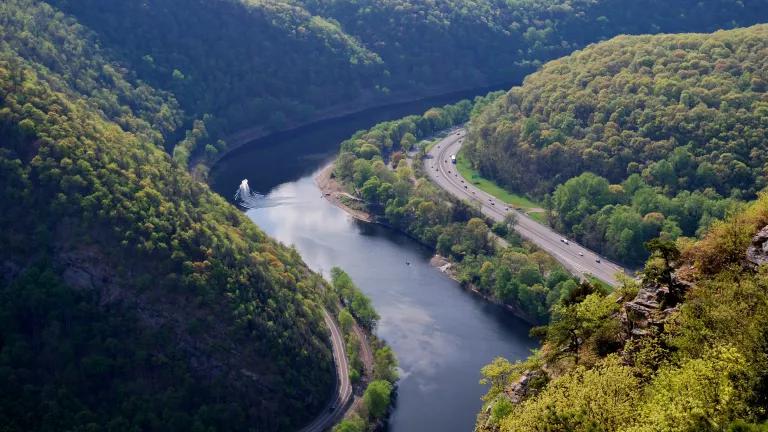Groups appeal for right to intervene in NJ pollution case, argue against settlement between ExxonMobil & Christie at this week's hearing
Joseph DiGiorgio, now a senior citizen, has lived in Bayonne most of his life. On June 3, he testified before the New Jersey General Assembly Judiciary Committee on the damage that decades of oil and chemical pollution from ExxonMobil has caused in his hometown. He told a story about playing outside as a child and digging in the ground with a friend near what was a high school at the time when they struck oil. He ran home and told his parents, "We're rich!" But, he says, it turned out to be decades-old sludge.
Mr. DiGiorgio described the water in the area as covered in oil slicks, saying: "I remember putting my fishing pole in the water and sitting there never catching a fish because there were no fish in the water. The water was completely polluted. There was zero oxygen level, I was told by the EPA one day, in the water."
And he ended his testimony with a simple call: "When I walk my dog at night, I'm obligated to clean up after him. Exxon has been walking their dog in Bayonne for a hundred years; they've yet to clean up after him."
This Thursday, July 30th, a New Jersey court will be weighing whether or not ExxonMobil will be forced to clean up after their dog, so to speak. The court will hold a hearing on the proposed settlement in case brought by the State of New Jersey against ExxonMobil Corporation damages due for decades of toxic soil and water contamination in the northern part of the state.
NRDC, as part of a coalition of seven environmental groups, hopes to be there urging the court to reject the settlement, which amounts to a multi-billion-dollar gift to the oil giant. Today, our coalition is filing an appeal of the court's order rejecting our motion to formally intervene as parties in the lawsuit a couple weeks ago. Last week we also requested the judge's permission to argue our case at Thursday's hearing as "friends of the court," and we're awaiting a decision. (In addition to NRDC, our coalition includes Clean Water Action, Delaware Riverkeeper Network, Environment New Jersey, NJ Audubon, NY/NJ Baykeeper, and Sierra Club New Jersey.)
In 2008, the courts found that approximately 1,800 acres of wetlands, marshes, meadows, and waters has been buried under, or otherwise adversely affected by, decades of spills and leaks at two ExxonMobil oil refineries and petrochemical operations: Bayway, located in Linden, and another in Bayonne. What were once vital ecosystems serving as habitats for a wide variety of wildlife--from flounder to terrapins and blue herons--are now wastelands as a result of more than a century of pollution. Instead of neighboring a rich natural area and natural flood buffer zone, the nearly 1 million people who live in adjacent zip codes now live in the shadow of a toxic dump contaminated with millions of gallons of oil and more than 600 chemicals, including some linked to cancer and several that pose other serious public health threats.
For years, the state has argued that ExxonMobil owes New Jerseyeans $8.9 billion in damages, a figure that was based on calculations from extensive state-commissioned expert studies. This spring, however, Governor Christie and his administration abruptly announced they've agreed to settle for $225 million. After accounting for litigation expenses and other offsets, that's less than 2 percent of the original price tag--or a 98 percent discount, offered with no real explanation.
The proposed settlement is a gross abdication of New Jersey's duty to manage its resources and finances for the public benefit. It is far too low to restore and replace the region's valuable ecosystems and make the public whole for the loss of their use. And the settlement doesn't commit a penny to restoration. More than 16,000 commenters, including our groups, submitted comments to the New Jersey Department of Environmental Protection asking them to reject the settlement. And now we are asking the court to do the same.
We're not alone in our plea.
Marion Cooney, a school teacher from Bayonne, also testified before the Assembly committee on June 3. She described Bayonne of yesteryear before the audience, as told in The Historical Heritage of Modern Bayonne by Dr. Walter Robinson. When Bayonne was first settled by the Europeans, the book says they saw "large deposits of oyster and clam shells at many places along our shores"... and land that "was pleasant with grass and flowers and goodly trees." All of this was replaced with one of the sites at issue in this case.
Ms. Cooney's testimony was followed by Matthew Zwerling, a New Jersey resident now in his sophomore year at the University of Florida. He told the court "as a 20-year-old, as I grow up and I'm deciding where I want to live in life, I'm not looking for who has the least -- the most lax regulations. I'm looking for the places in this country that still have some of the natural beauty of the state that this world had for millions of years before we came and did what we did."
We hope the court will call on ExxonMobil to restore this area to its former glory for future generations to enjoy once again. That means rejecting the proposed multi-billion-dollar gift from Gov. Christie and his administration to the oil giant, at the expense of New Jersey residents.
In the words of Mr. DiGiorgio it's about time ExxonMobil stop "trying to slip out the back door and run away before they get caught not cleaning up after their big dog."




